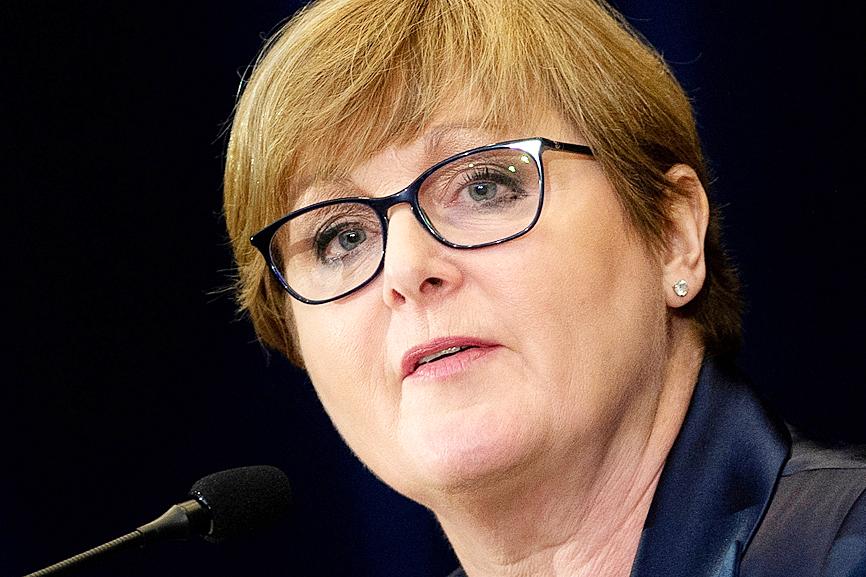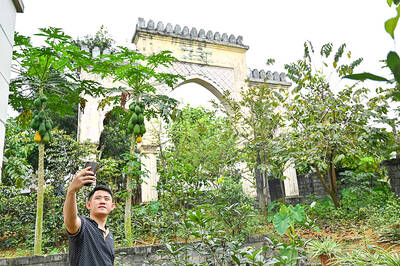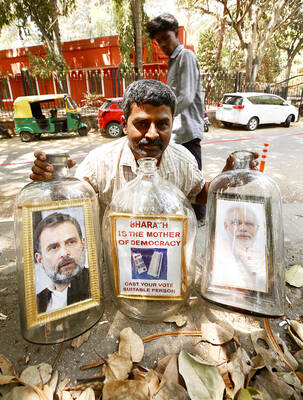Australian military personnel who spoke out against alleged war crimes in Afghanistan yesterday said that they felt vindicated by an inquiry which called for possible prosecution of troops, as the nation reacted with shame and anger at the severity of the findings.
A report published on Thursday found that Australian special forces personnel allegedly killed 39 unarmed prisoners and civilians in Afghanistan, with senior commandos forcing their juniors to kill defenseless captives to “blood” them for combat.
The report recommended referring 19 current and former troops for potential prosecution, in a development that prompted anguish in Australia, which usually honors its military history with fervor.

Photo: Reuters
David McBride, a former military lawyer facing charges of leaking information about special forces actions in Afghanistan, felt “buoyed” by the report after years of being treated like a “traitor to the diggers,” his lawyer Mark Davis said, using the Australian slang for soldiers.
“If the accusations that he’s previously made are proven right, he will feel vindicated whatever the penalty,” Davis said by telephone. “His reputation will be intact and his sense of honor will be intact.”
McBride has confirmed giving classified documents to Australian Broadcasting Corp (ABC), triggering charges against him and an investigation into the public broadcaster which sensationally led to a raid on its Sydney headquarters last year.
Police last month dropped the ABC investigation, citing lack of public interest in proceeding, but McBride still faces a lengthy prison sentence if found guilty after a trial next year.
His charges must now also be dropped, Davis said.
Dusty Miller, a special forces medic who testified at the inquiry, told ABC that hearing Australian Minister for Defence Linda Reynolds publicly confirm his claims was “complete vindication.”
The report has been described by the Australian government as one of the nation’s darkest military chapters. Lawmakers have walked a delicate line of condemning the allegations in the report and supporting the possibility of prosecutions, while expressing solidarity with the armed forces.
“It made me physically ill, and it was a very distressing read,” said Reynolds, a former army officer. “I know that it certainly didn’t represent my service ... and it certainly doesn’t represent the majority of men and women who have and continue to serve our nation with such great distinction.”
Australian Prime Minister Scott Morrison earlier said that the report would be troubling for the nation and its military, but has not commented since its publication.
Overnight, the office of Afghan President Ashraf Ghani wrote on Twitter that Morrison had “expressed his deepest sorrow” over the allegations.
Afghans welcomed the prospect of bringing the perpetrators to justice, but were divided on the question of where.
“They who have committed such a big crime must be handed to face the law of Afghanistan and should be punished accordingly,” Kabul resident Abdul Mutahal said.
Mohammad Isaaq Faiaz, an imam, said that the alleged perpetrators “should be brought to justice in Australia and the affected families of those martyred must be paid.”

Le Tuan Binh keeps his Moroccan soldier father’s tombstone at his village home north of Hanoi, a treasured reminder of a man whose community in Vietnam has been largely forgotten. Mzid Ben Ali, or “Mohammed” as Binh calls him, was one of tens of thousands of North Africans who served in the French army as it battled to maintain its colonial rule of Indochina. He fought for France against the Viet Minh independence movement in the 1950s, before leaving the military — as either a defector or a captive — and making a life for himself in Vietnam. “It’s very emotional for me,”

The Chinese Communist Party’s (CCP) Central Committee is to gather in July for a key meeting known as a plenum, the third since the body of elite decisionmakers was elected in 2022, focusing on reforms amid “challenges” at home and complexities broad. Plenums are important events on China’s political calendar that require the attendance of all of the Central Committee, comprising 205 members and 171 alternate members with Chinese President Xi Jinping (習近平) at the helm. The Central Committee typically holds seven plenums between party congresses, which are held once every five years. The current central committee members were elected at the

Indian Prime Minister Narendra Modi reaffirmed his pledge to replace India’s religion-based marriage and inheritance laws with a uniform civil code if he returns to office for a third term, a move that some minority groups have opposed. In an interview with the Times of India listing his agenda, Modi said his government would push for making the code a reality. “It is clear that separate laws for communities are detrimental to the health of society,” he said in the interview published yesterday. “We cannot be a nation where one community is progressing with the support of the Constitution while the other

CODIFYING DISCRIMINATION: Transgender people would be sentenced to three years in prison, while same-sex relations could land a person in jail for more than a decade Iraq’s parliament on Saturday passed a bill criminalizing same-sex relations, which would receive a sentence of up to 15 years in prison, in a move rights groups condemned as an “attack on human rights.” Transgender people would be sentenced to three years’ jail under the amendments to a 1988 anti-prostitution law, which were adopted during a session attended by 170 of 329 lawmakers. A previous draft had proposed capital punishment for same-sex relations, in what campaigners had called a “dangerous” escalation. The new amendments enable courts to sentence people engaging in same-sex relations to 10 to 15 years in prison, according to the